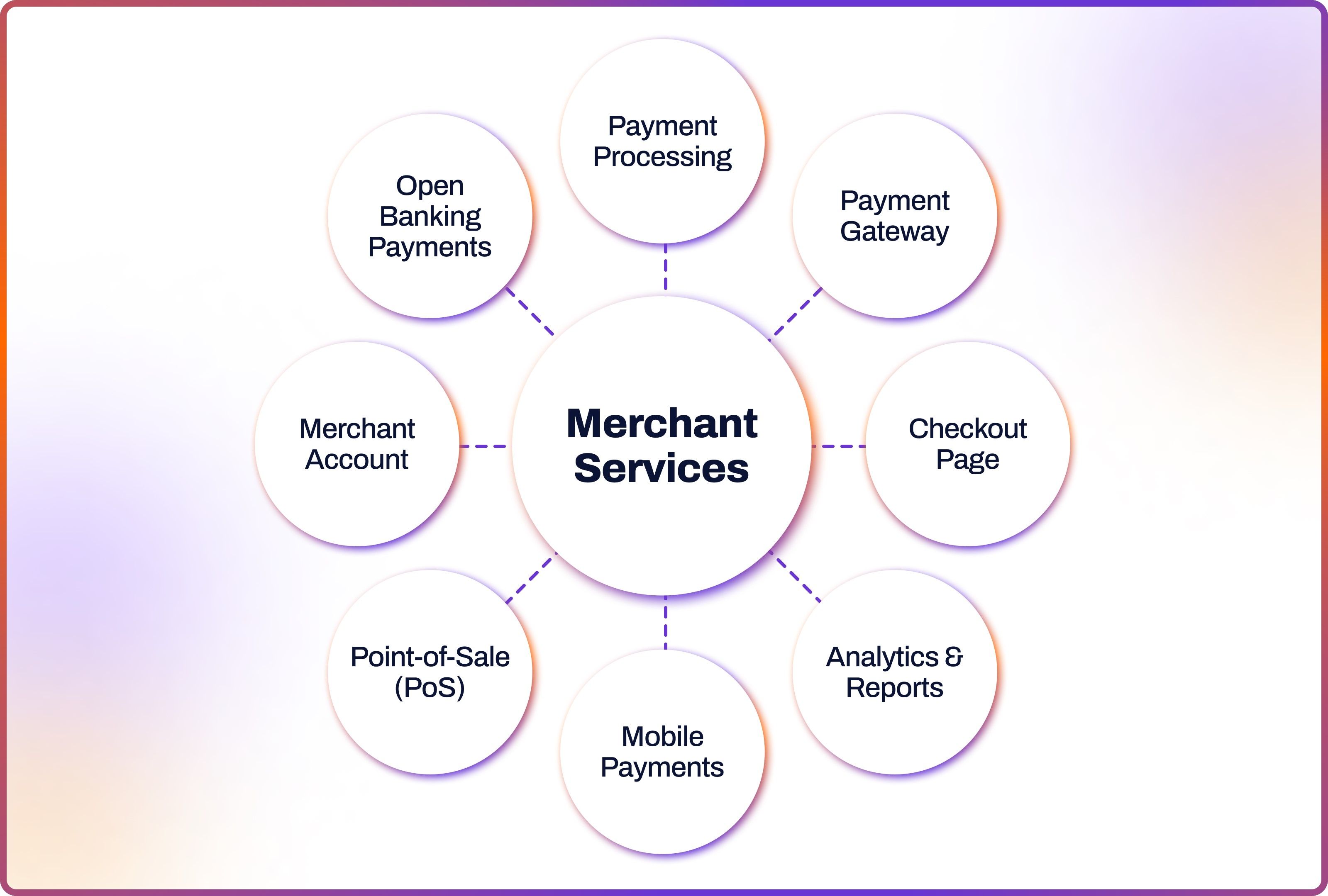
Setting up or expanding your business involves managing a long list of tasks. Success in a fast-paced business world requires knowledge, persistence, and determination. When it comes to SME payment solutions, partnering with a trusted provider can make all the difference.
In this article we will explore the definition of small-business merchant services, why you should have one, and how to choose the best provider.
What Are Merchant Services?
Merchant payment services encompass all the essentials a small business needs to accept and process payments. This includes the necessary hardware, software, and other services for handling cards, mobile wallets, contactless, and other payment methods. They are typically provided by banks, payment processors, and other financial companies.

Why Small Businesses Need Merchant Services
Simply because you need to accept payments smoothly and efficiently. By partnering up with a reliable provider of SME merchant services, you can ensure seamless processing for your small business as well as regulatory compliance. Additionally, merchant services often come with extra features to support your small business, such as open banking payments or online reporting tools.
Best Merchant Services for a Small Business: Essentials
- Payment Processing: Vital for daily operations, offering both online and in-person payment solutions. Streamlines complex merchant processing for small businesses, including communications between gateways, processors, banks, and credit networks.
- Payment Gateway: Acts as a secure middleman between customers and payment processors. Payment gateways encrypt and transmit payment details for safe online transactions.
- Point-of-Sale (PoS): Refers to the necessary hardware and software for payments. For example, may include cash registers and digital systems for physical stores and e-commerce.
- Merchant Account: Links businesses to merchant service providers to accept payments. A merchant account for small business acts as an intermediary between the customer's bank and the business's bank.
Merchant Services for a Small Business: Extra Features
- Analytics & Reports: Collecting and organising customer and payment data. Provides valuable insights for sustainable business growth.
- Checkout Page Optimisation: Simplifies process to reduce cart abandonment. Usually customisable to match your branding for a smooth user experience.
- Mobile Payments: Facilitates payments via mobile devices like tablets and smartphones. They would typically support popular mobile wallets such as Apple Pay and Google Pay, and in-app payment options.
- Open Banking Payments: Driven by the EU's PSD2 regulation, open banking enables secure data sharing via application programming interfaces (APIs). It facilitates account-to-account (A2A) payments with quick fund transfers and improved user experience.
What to Pay Attention to as a Small Business
The challenges you face in managing operations as a smaller company can differ significantly from those of larger enterprises. You may be more susceptible to certain issues. Thus, it's crucial to be mindful of specific factors when selecting a merchant service provider.
Transaction Speed
As a small business owner, it can be quite frustrating to experience strong sales yet have to wait days or weeks to access your funds. This is a common issue, with research by Payit in December 2023 revealing that over a quarter (27%) of British SMEs are owed between £5,000 and £20,000 in unpaid invoices.
Fast transactions are crucial because they directly affect your cash flow and daily business operations. Knowing when your funds will be deposited into your bank account helps you manage your finances more effectively.
Payment Security
Failure to comply with industry and regulatory data security standards, such as PCI DSS, can lead to significant consequences. These include potential fines, additional fees, loss of income, and damage to your brand's reputation.
Yet small business owners may lack expertise, time, or resource to stay up-to-date. Therefore, partnering with a provider that employs latest cybersecurity tools and is fully compliant is vital.
Scalability
You’ll probably want to grow your small business bigger one day. To ensure this possibility, select a provider capable of supporting the future expansion. Seek out scalable plans that can accommodate varying transaction volumes. Additionally, choose a provider experienced in working with businesses of all sizes.
Payment Methods
Research from the Baymard Institute shows that around 70.19% of online shopping carts are abandoned. This means that for every 10 customers who add items to their carts, seven do not complete the purchase. Such abandonment leads to an estimated $260bn in lost potential sales.
Small businesses simply can’t afford these losses. Yet some of the lost revenues can be avoided by offering users with a wide list of payment methods such as digital wallets, card payments, buy now pay later (BNLP) and open banking payments. Choose a merchant services provider that can offer such a list.
Merchant Services Fees for a Small Business
As a small business with often limited budgets, it's important to familiarise yourself with the fee structure or pricing plan of a provider. Ensure you understand how these fees work and confirm they are affordable for your business.
Below are some common fees you may encounter; however, the actual fee structure can vary between providers, so it's best to check directly with them for specific details.
| Fee type | Description |
| Hardware Fee | Rental or purchase for a chip and PIN machine, either one-off or monthly depending on the contract |
| Payment Gateway | Integration fee for hosted checkout pages and API for custom development |
| Transaction Cost | Charged per transaction for processing credit and debit card payments |
| Chargebacks | Fee for a reversed transaction |
| Early Termination Fee | Charged if the contract is exited early, often based on the remaining contract period |
| Setup Fee | Initial cost to set up physical or virtual terminal |
| Cancellation Fee | Fixed fee for canceling the contract |
| Minimum Monthly Transaction Fee | Smallest amount charged monthly on transaction fees |
| Data Security Management | Fee for ensuring PCI compliance standards are met |
| Non-secure Transaction | Fees for high-risk payments like mail, telephone, online (not pay-by-link), and non-chip and PIN payments |
| Refunds | Fee for processing refunds |
| Anti-Fraud Monitoring | Fee for services that monitor transactions to detect and prevent fraudulent activity |
| Authorisation Fee | Charged each time a business authorises a credit card transaction |
Open Banking for Small Businesses
Open banking offers a smart solution for small businesses. Pay-by-bank, or A2A payments, let users pay directly from their bank accounts, skipping card intermediaries. Customers use their online banking credentials to authorise payments.
This improves UX, reduces cart abandonment, strengthens security and cuts costs for small-business merchants. As mentioned earlier, open banking relies on APIs, which are used for secure data sharing between banks and authorised fintech companies, like Noda. Since 2018, the EU’s PSD2 regulation required banks to share data with customer consent.
According to the Open Banking Limited report published in 2022, there was a significant positive impact of open banking solutions on the UK’s SME’s operations. Specifically, they led to an 82% increase in overall efficiency, while reducing internal costs by 48% and external costs by 53%.
Elevate Payments with Noda
Noda is a global open banking provider that assists online merchants with end-user KYC, payment processing, LTV forecasting and UX optimisation. We partner with 2,000 banks across 28 countries, spanning over 30,000 bank branches. Noda supports a wide range of currencies for globally-minded clients. We offer scalable plans to fuel your business growth and e-commerce plugins for easy integration.
With Noda's advanced Open Banking API, online businesses can easily integrate direct bank payments, offering their customers a seamless and secure payment experience with lower fees. Whether you're looking to enhance customer verification processes, optimise payment systems, forecast long-term value, or refine the user experience, Noda is your partner in growth.
Latest from Noda

Payment Methods in Ireland in 2026: Everything You Need to Know

Top Payment Methods in Austria: How to Accept Payments Efficiently in 2026

GoCardless Review 2026: What Merchants Need to Know


